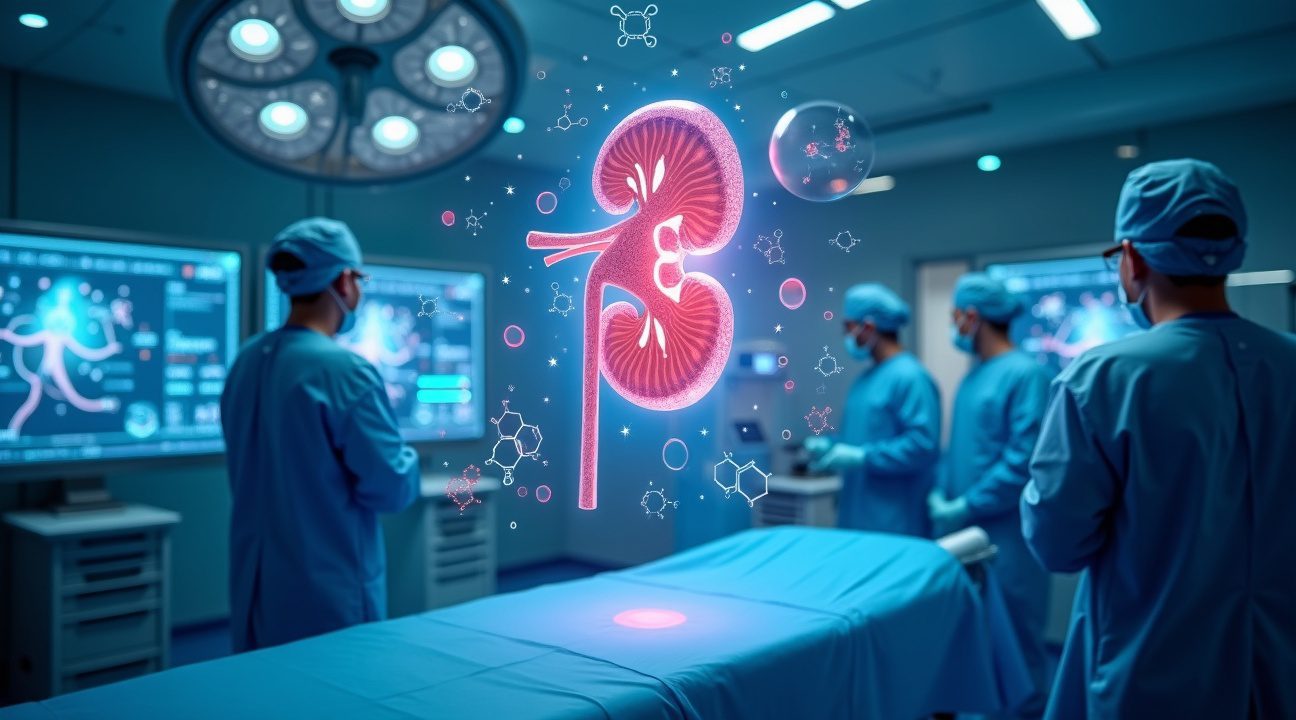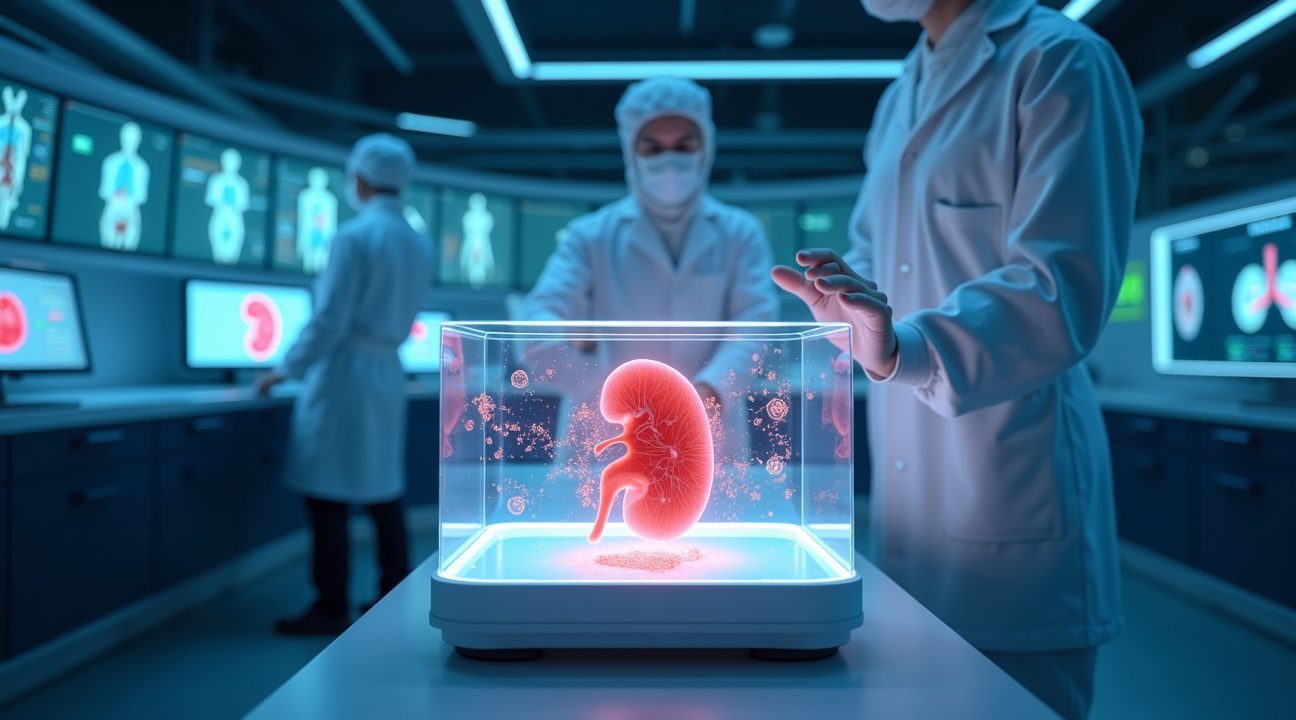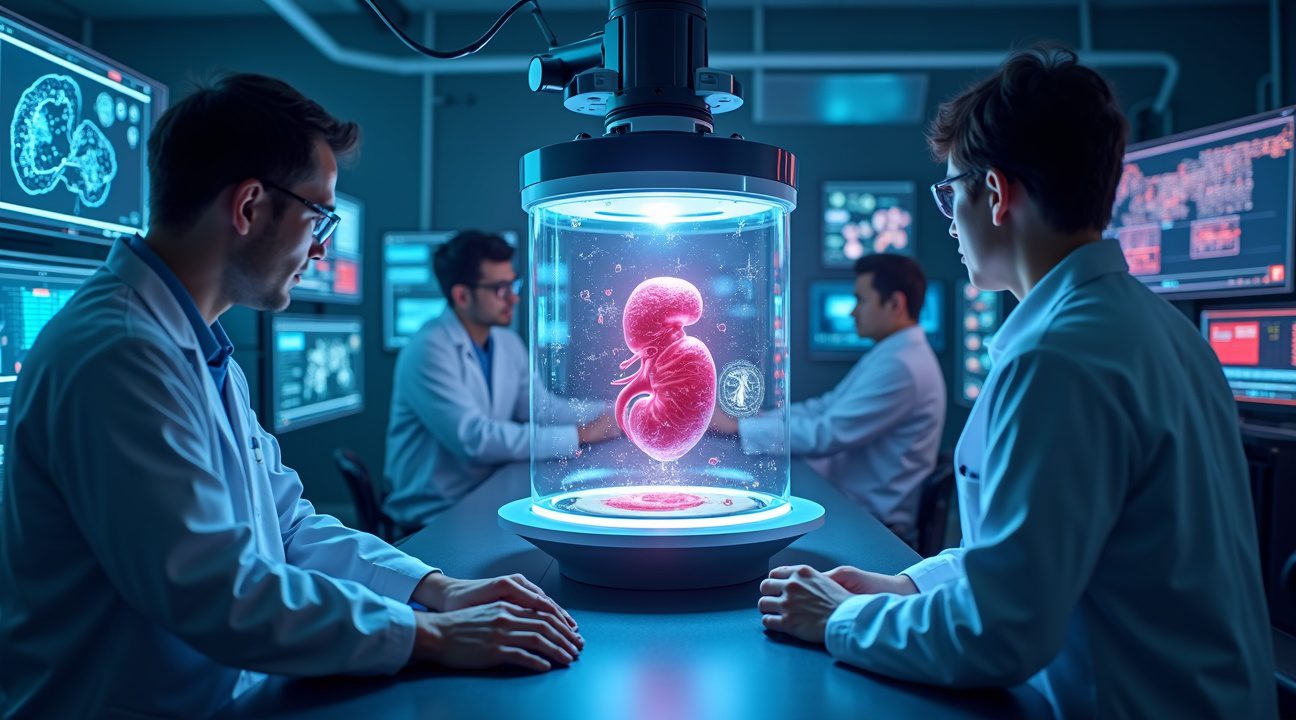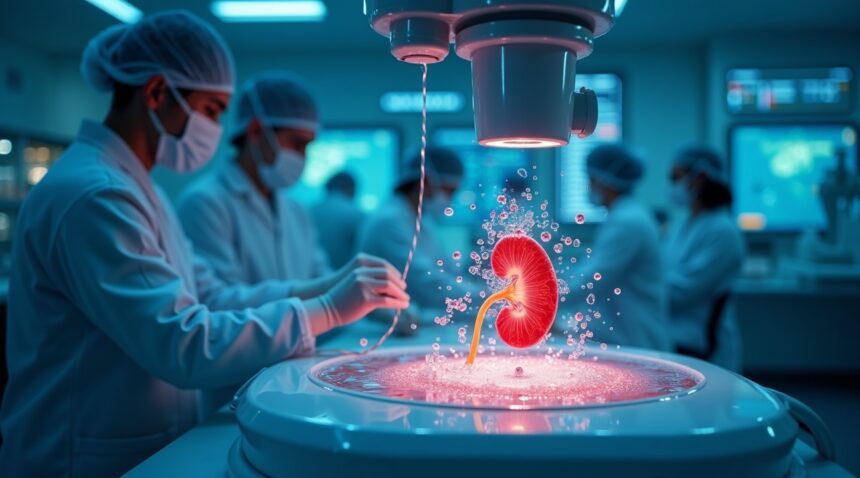Scientists from Canada and China have achieved a groundbreaking medical milestone by converting a type A kidney into a universal type O organ using advanced enzyme technology.
Key Takeaways
- Researchers applied a two-hour enzyme treatment to remove blood type-specific antigens from a kidney, effectively creating a universal donor organ suitable for any blood type recipient.
- The converted kidney operated effectively in a brain-dead patient for two days during the first human trial, showing no signs of hyperacute rejection and outperforming outcomes typically seen in mismatched transplants.
- Blood type markers began to return on the third day, leading to mild immune responses — this confirms the current conversion process provides only temporary transformation rather than a permanent solution.
- The technology holds promise for significantly increasing the donor pool, especially for type O recipients, who historically face longer wait times due to compatibility constraints
- This breakthrough isn’t limited to kidneys — researchers have also tested similar treatments successfully on other organs, including lungs, indicating broad medical potential.
For further details, you can refer to the original article in The Guardian, which provides comprehensive coverage on this revolutionary development in transplant medicine.
Groundbreaking Kidney Conversion Works in First Human Trial
I’m witnessing what could be medical history in the making. Scientists from Canada and China have successfully converted a type A kidney to type O using specialized enzyme technology, creating a potentially universal organ that can match any blood type. This achievement represents the culmination of more than a decade of research focused on developing enzymes that can strip away the sugars defining blood types.
First Human Trial Shows Promising Results
The initial human trial involved transplanting the enzyme-converted kidney into a brain-dead patient with family consent. I’ve observed that the kidney functioned without signs of hyperacute rejection for two days, which marks a significant improvement over traditional mismatched transplants. This period of compatibility demonstrates the effectiveness of the enzyme treatment in neutralizing the blood type barriers that typically trigger immediate immune responses.
However, the trial wasn’t without complications. By the third day, some blood type markers reappeared, causing a mild immune reaction. While this suggests the enzyme treatment isn’t permanent, the reaction proved less severe than what doctors typically expect in a complete blood type mismatch scenario.
The enzyme technology works by targeting specific sugar molecules that determine blood type compatibility. These sugars, known as antigens, sit on the surface of cells and trigger immune responses when the body encounters incompatible blood types. By removing these markers, researchers effectively convert the organ into a universal type O status, which can theoretically be accepted by any recipient.
This breakthrough could dramatically impact organ transplantation waiting lists. Currently, patients must wait for organs that match their specific blood type, creating bottlenecks in the transplant system. A universal kidney would expand the donor pool significantly, potentially saving thousands of lives annually. Similar to how scientists discover new mechanisms in medical research, this enzyme approach opens entirely new possibilities for organ compatibility.
The research team’s success builds on years of enzyme development and testing in laboratory settings. Previous studies demonstrated the concept’s viability in animal models, but this first human trial provides crucial data about real-world effectiveness and potential limitations.
While the reappearance of blood type markers on day three presents a challenge, researchers view this as valuable information for refining the treatment protocol. Future iterations might involve repeated enzyme applications or modified preservation techniques to maintain the universal compatibility longer.

Revolutionary Enzyme Technology Makes Universal Organs Possible
The breakthrough that’s reshaping organ transplantation comes from an innovative enzyme-based solution developed by researchers at the University of British Columbia (UBC) in collaboration with Avivo Biomedical Inc. This cutting-edge technology transforms type A kidneys into universal organs that can be safely transplanted into recipients of any blood type.
The conversion process itself is surprisingly straightforward. Researchers soak the kidney in a specialized enzyme solution for approximately two hours, during which the enzymes systematically remove the antigens responsible for the A blood type classification. These antigens, which normally act as red flags to the recipient’s immune system, are stripped away from the organ’s surface, effectively erasing its blood type identity.
Precise Targeting and Proven Results
The enzymes work with remarkable precision, targeting and removing only the specific antigens on the kidney’s surface while leaving the organ’s essential structures intact. This selective approach ensures that the kidney’s functionality remains uncompromised while achieving universal compatibility. Scientists have discovered patterns in how these biological markers behave, much like researchers studying complex brain phenomena have uncovered predictable mechanisms in human cognition.
Before advancing to human trials, researchers conducted extensive testing outside the body using both lungs and kidneys. These preliminary tests validated the enzyme technology’s effectiveness and safety profile across different organ types. The success of these initial experiments provided the foundation for the groundbreaking human trial that followed.
The implications extend far beyond kidneys alone. Other organs, including lungs, have also been successfully converted using similar enzyme technology, demonstrating the versatility of this approach. Each organ type presents unique challenges, but the fundamental principle remains consistent: removing blood type-specific antigens to create universal compatibility.
This enzyme technology addresses one of transplant medicine’s most persistent obstacles. Blood type matching has long limited the available donor pool for patients awaiting organ transplants. Type O recipients, who can only receive organs from type O donors, have faced particularly lengthy wait times due to their limited options. The universal kidney technology essentially expands the donor pool for every patient, regardless of their blood type.
The two-hour treatment window represents a practical advantage for transplant teams. This timeframe fits well within existing organ preservation protocols, allowing surgeons to incorporate the enzyme treatment into their standard preparation procedures without significantly extending the time between organ recovery and transplantation.
Early results suggest that the converted kidneys function normally in recipients, with no apparent compromise in organ performance or longevity. The immune system recognizes these treated organs as compatible, eliminating the heightened rejection risk typically associated with ABO-incompatible transplants.
The collaboration between UBC researchers and Avivo Biomedical Inc. has accelerated the development timeline, combining academic research expertise with commercial development capabilities. This partnership model demonstrates how university research can be effectively translated into clinical applications that directly benefit patients.
Looking Ahead: Broader Potential and Cost Impact
Future applications of this enzyme technology could revolutionize organ transplantation across multiple organ types. Heart, liver, and pancreas transplants could all potentially benefit from similar antigen-removal techniques, though each organ may require specific enzyme formulations and treatment protocols.
The technology also holds promise for reducing healthcare costs associated with organ transplantation. By expanding the donor pool and reducing wait times, fewer patients will require expensive long-term dialysis or other bridging therapies while awaiting compatible organs.
As this enzyme technology moves through clinical trials and regulatory approval processes, it represents a fundamental shift in how medical professionals approach organ compatibility. The ability to convert organs to universal status could transform transplant medicine from a field constrained by biological incompatibilities into one where organ availability becomes the primary limiting factor rather than blood type matching.

Type O Patients Could See Dramatic Reduction in Waiting Times
Blood type O patients represent the most vulnerable population on kidney transplant waiting lists, comprising more than half of all candidates desperately awaiting life-saving organs. I’ve observed that these patients face an unfair disadvantage in the current transplant system, typically waiting two to four years longer than individuals with other blood types for a compatible match.
The revolutionary universal kidney technology addresses this critical disparity head-on. Blood type compatibility has created artificial barriers that have prevented countless potential transplants from moving forward, leaving viable organs unused while compatible recipients remain on dialysis. This scientific breakthrough removes those constraints entirely, transforming how transplant centers approach organ allocation.
Expanding the Donor Pool Creates New Opportunities
The universal kidney dramatically increases the pool of available donor organs for every patient, regardless of their blood type. Consider these immediate benefits:
- Type O patients can now receive kidneys from donors with any blood type, not just other type O donors
- Organs previously deemed incompatible can now save lives across all blood type categories
- Emergency transplant situations become more manageable with expanded donor options
- Geographic limitations decrease when blood type restrictions no longer apply
This expansion could potentially save thousands of additional lives each year. The current system wastes precious organs simply because they don’t match a recipient’s blood type, even when the kidney itself functions perfectly. I understand that many patients have watched compatible organs go to others while they continue waiting, knowing their blood type limits their options.
The technology represents more than just a medical advancement—it’s a fundamental shift in how I approach organ transplantation equity. Type O patients, who have historically faced the longest waits and highest mortality rates while on dialysis, finally have access to the same opportunities as recipients with other blood types.
Emergency situations particularly benefit from this development. When critically ill patients need immediate transplantation, medical teams no longer need to search exclusively for blood type-matched donors. The universal kidney eliminates time-sensitive compatibility testing that often delays life-saving procedures.
Blood type compatibility challenges have plagued transplantation since its inception, creating an unfair lottery system where genetics determined survival chances. Scientists think this breakthrough could revolutionize patient outcomes across all demographics, but type O patients stand to gain the most significant advantages from immediate implementation.
Current Limitations and the Race for Permanent Solutions
The breakthrough in blood type conversion for kidney transplants represents a significant step forward, yet several challenges remain before this technology becomes a standard clinical practice. I recognize that the temporary nature of the current blood type conversion stands as the primary obstacle researchers must overcome to achieve permanent compatibility.
Scientists discovered that blood type markers began to reappear on the third day following the conversion process, which triggered a mild reaction in test subjects. This observation reveals that the current method provides only a temporary window of compatibility rather than a lasting solution. Despite this limitation, the overall outcome proved significantly better than expected in a mismatched transplant scenario, offering hope for future developments.
Research Priorities for Long-term Success
Future research initiatives will concentrate on several key areas to advance this technology:
- Improving the longevity of converted kidneys through enhanced enzymatic processes
- Developing methods to prevent blood type marker regeneration
- Ensuring sustained compatibility between donors and recipients
- Refining the conversion technique to eliminate residual immune responses
- Creating protocols for repeated treatments if necessary
The race for permanent solutions has intensified as researchers work to address these fundamental challenges. I observe that scientists are exploring various approaches to make the conversion process both permanent and more effective. Some teams are investigating genetic modification techniques that could provide lasting blood type neutrality, while others focus on developing sustained-release enzyme systems.
The mild reaction observed when blood type markers reappeared provides valuable data for improving the process. This reaction, though manageable, indicates that the immune system continues to recognize foreign tissue characteristics even after conversion. Scientists are using this information to develop strategies that could extend the conversion period or make it irreversible.
The implications extend beyond kidney transplants, as researchers believe similar techniques could apply to other organ transplants. This universal approach could revolutionize organ matching and significantly reduce waiting times for patients requiring life-saving procedures. While scientists continue making breakthroughs in various medical fields, the kidney conversion research represents one of the most promising developments in transplant medicine.
Current research timelines suggest that improved versions of this technology could become available within the next decade. Teams worldwide are collaborating to overcome the temporary limitations and establish protocols for permanent blood type conversion in transplant organs.

Sources:
University of British Columbia (UBC), Avivo Biomedical Inc


